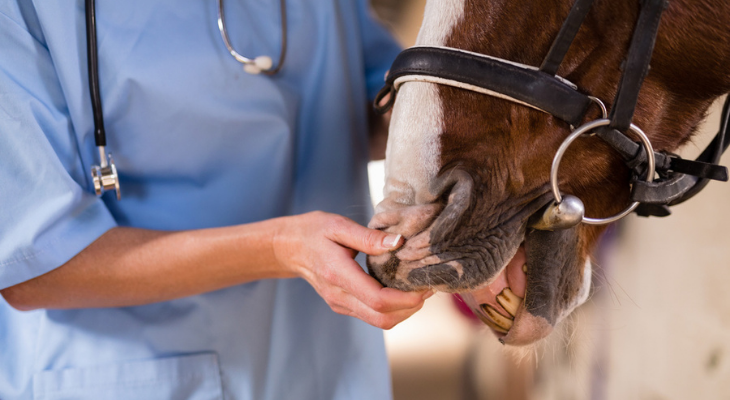
What You Can Do to Protect and Maintain Your Horse's Oral Health
Dental issues not only cause pain but can affect your horse's ability to chew or accept a bit or bridle. Luckily, you can keep your horse's teeth in good condition by keeping these recommendations in mind.
Know the Signs of Dental Problems
Although your horse can't complain to you about a sharp tooth or inflamed gums, a change in its behavior could be caused by a tooth issue. Signs of oral health issues in equines may include:
- Weight loss
- Disinterest in eating
- Cuts on the tongue or mouth
- Quidding (balling up food in the mouth and swallowing rather than chewing)
- Facial or jaw swelling
- Bad breath
- Sharp pointed areas on the ends of the teeth (usually on upper or lower molars)
- Loose teeth
- Broken teeth
- Fighting the bit
- Nasal discharge
- Drooling
- Dropping feed when eating
- Chewing more slowly than normal
- Holding the head in an unusual position when eating
- Head tossing
- Unchewed hay in manure
- Bleeding in the mouth
Let your equine veterinarian know immediately if you notice any of these signs. Prompt treatment will improve your horse's comfort and prevent oral health conditions from worsening.
Make Regular Dental Examinations a Priority
Oral health problems aren't always obvious. In fact, some horses may be in significant pain yet never display any behavioral changes. Luckily, your equine veterinarian can spot signs of trouble during yearly dental examinations. During exams, the equine veterinarian:
- Makes sure all teeth have erupted normally
- Looks for signs of unusual wear, breaks, cracks, tartar, cysts, lacerations, infections, loose teeth, and retained caps
- Checks the soft tissues of the mouth
- Evaluates the alignment of the teeth and jaw and makes sure jaw muscles are balanced
Your veterinarian will also check for signs of gum disease, the primary cause of tooth loss in horses, according to DVM360. If your veterinarian identifies a problem, they may need to take a few X-rays of your horse's teeth before recommending a treatment plan. Younger and older horses may benefit from more frequent dental checkups.
Ask Your Equine Veterinarian About Floating Sharp Teeth
Sharp points on your horse's teeth can cause painful cuts on your horse's tongue and mouth. The points develop due to uneven wear on the teeth. Stabled horses may be more likely to develop points due to the softer types of feed they consume, according to the American Association of Equine Practitioners. The problem is easy to correct with floating, a process that files the points with a dental tool called a float. Many, but not all, horses benefit from annual floating. Floating is usually performed with a local anesthetic for your horse's comfort.
Make Sure Wolf Teeth Aren't Causing a Problem with the Bit
Wolf teeth are small teeth found in the part of the mouth where the bit fits. The teeth erupt when your horse is between 5 months to 1 year, although not all horses have wolf teeth. Since the teeth can interfere with the bridle, it may make sense to extract them to avoid issues in the future. Your equine veterinarian can help you decide if these teeth need to be removed. Fortunately, wolf teeth aren't essential for chewing, and removing them won't cause any problems for your horse.
Are you concerned about your horse's teeth? Give us a call, and we'll arrange an oral health visit with the equine veterinarian.
Sources:
DVM360: Periodontal Disease in Horses: What Causes It - and How to Fix It, 3/17/20
University of Illinois College of Veterinary Medicine: Horses Need to See the Dentist Too, 4/21/18
